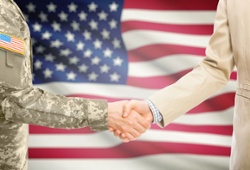2 min read
Vet Law Blog - A Year Since Kingdomware and the Rule of Two
Joe Whitcomb
:
October 11, 2023

It has been a little over a year now since the US Supreme Court issued its opinion in Kingdomware Technologies, Inc. v. United States, 136 S. Ct. 1969 (2016). In that case, the court held requirements and procedures in the Veterans Benefits Act of 2006 ("VBA"), 38 U.S.C. § 8127 were mandatory, not discretionary as applied to the U.S. Dept. of Veterans Affairs (VA) contracting with Service Disabled Veteran Owned Small Business (SDVOSB) and Veteran Owned Small Business (VOSB) owners to provide services or equipment to the VA.
The purpose of the VBA was to set annual goals for contracting with SDVOSB and other VOSB. To help reach those goals, a provision known as the "Rule of Two" provided that the VA "shall award contracts" by restricting competition to veteran-owned small businesses if the VA reasonably expects that at least two of such businesses will submit offers and that "the award can be made at a fair and reasonable price that offers best value to the United States." 38 U.S.C. § 8127(d).
In Kingdomware Technologies, the Supreme Court held that the Rule of Two analysis was mandatory. The VA was not allowed to make procurement decisions with respect to VA goods and services without making a Rule of Two assessment. Further, the Rule applied to all VA procurements. It was a big win for VOSB and SDVOSB. We called it a "game changer for SDVOSB and VOSB companies."
New Case Law Since Kingdomware: PDS Consultants
Beyond the VBA, there are other federal statutes that have set-asides for various groups and purposes. One such statute is the Javits-Wagner-O'Day Act, 41 U.S.C. § 8501-06 ("JWOD"). The JWOD provides for set-asides for certain nonprofits that employ blind and otherwise severely disabled people when those products or services appear on a list known as the "AbilityOne List."
Since both the VBA and JWOD apply to the VA, inevitably the question arose as to which statute takes priority when a product or service is on the Ability One List. The US Court of Federal Claims recently held that the VBA takes priority for VA procurement in the case PDS Consultants, Inc. v. US, No. 16-1063C (Court of Federal Claims May 30, 2017). Plaintiff PDS Consultants filed a bid protest with respect to a VA procurement contract for eyeglasses that the VA made with a not-for-profit called Winston-Salem Industries for the Blind ("IFB"). IFB hired visually-impaired employees and, as such, had priority under the JWOD. The eyewear at issue had been added to the AbilityOne List in 2010.
After lengthy discussion of the two statutes and the Kingdomware decision, the court ruled that the VBA took priority. The court stated...
"... the VBA requires the VA to perform the Rule of Two analysis for all new procurements for eyewear, whether or not the product or service appears on the AbilityOne List, because the preference for veterans is the VA's first priority. If the Rule of Two analysis does not demonstrate that there are two qualified veteran-owned small businesses willing to perform the contract, the VA is then required to use the AbilityOne List as a mandatory source."
Obviously, the decision is limited to the Veteran's Administration since the VBA does not apply to other federal agencies.
IFB is appealing the case to the Court of Appeals for the Federal Circuit. See the news report here.
Contact Whitcomb, Selinsky, PC
If you have any questions regarding veteran-owned businesses and government contracts, contact Whitcomb, Selinsky, PC. We are a law firm dedicated to helping veterans. As discussed previously, there are many business opportunities for veteran-owned small businesses.
Call us today at 866-476-4558 (toll-free) at (303) 534-1958 or contact us through our website.


